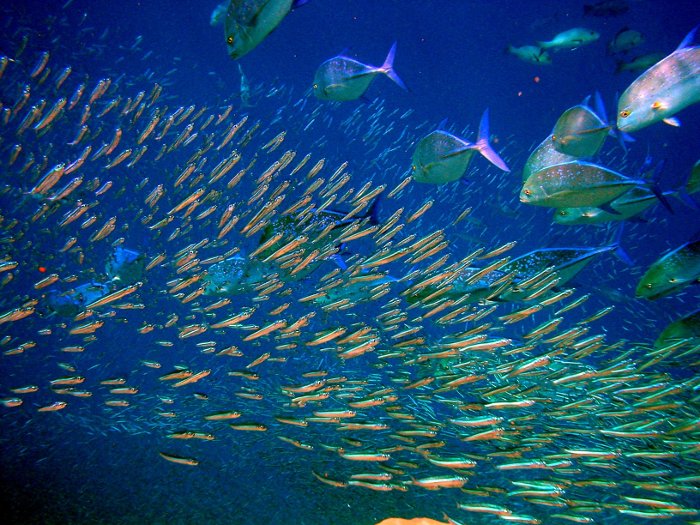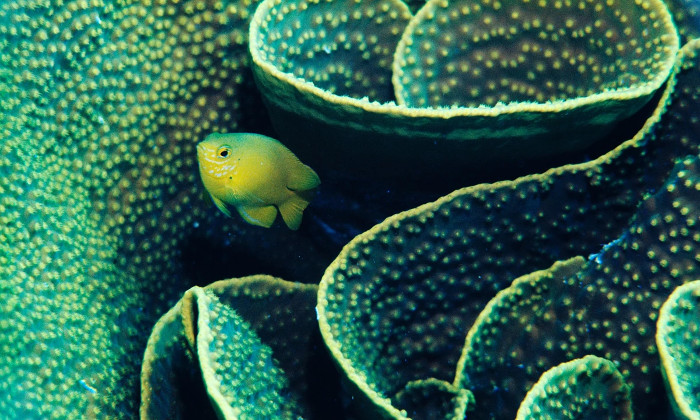Fish are disoriented due to the high concentration of CO2
According to marine researchers from Australia, if a major acidification situation is going badly, many fish populations may be disoriented in the middle of a large positive belt.
Researchers come from University. New South Wales (UNSW) has discovered that, if the atmospheric CO 2 situation continues to increase, fish and many other marine animals will encounter "poisoning" phenomenon in 2050 as many projects. guessed earlier.
According to Xinhua, predicted CO 2 poisoning occurs when atmospheric CO 2 concentrations exceed 650 parts per million. With such a concentration of CO 2 , the fish will be severely affected by poisoning and disorientation in the ocean.

CO2 affects the fish's brain and causes them to lose their sense and orientation to return to their habitat.
Dr. Ben McNeil is from the University's Center for Climate Change Research. New South Wales said: " CO2 affects the fish's brain and makes them lose their sense of direction and ability to return to their habitat . Even fish will not know the location of predators. are stalking them ".
The conclusion of the study was published in the journal Nature. Researchers have used a global database of CO 2 concentrations in seawater. This database has been collected by various oceanographic programs over the past 30 years.
Dr. Tristan Sasse, co-author of the study, said: "Research will allow us to predict natural fluctuations that can be amplified up to 10 times in some ocean areas by the end of the century. if the atmospheric CO 2 content continues to increase ".

1/2 marine life will be affected by elevated CO2 content in 2100.
The results show that nearly half of marine life will be affected by high levels of CO2 in 2100. This also indirectly affects the fisheries and marine ecosystems across the planet.
In another study from New Zealand, ocean acidification has a great relationship to the disorientation of fish. The study was published in the journal Biology Letters.
The ABC website of Australia said ocean acidification caused the smell of water to change as well as affect the sound of underwater transmissions . Sound is the most important factor that helps fish as well as other marine creatures can determine the direction of movement.
To understand how ocean acidification affects marine animals, the team led by Dr. Tulio Rossi came to test at a carbon dioxide hole near White Island in New Zealand, where It is predicted that ocean acidification levels are almost similar to those predicted by the end of the century.

High levels of CO2 alter the behavior of fish larvae quite a lot.
Dr. Nagelkerken shared: "This natural laboratory gives us a closer look at the future. We note the sounds emitted from the vent and then compare the noise level and the sound component measured. When the acidification level increases, the kelp forest can disappear and replace it with turf algae, which leads to big changes in the number of marine animals. sound out ".
In addition, the team also found that high levels of CO 2 significantly changed the behavior of fish larvae. Ocean acidification increases the size of fish ear bones, thereby directly affecting the hearing and sound, orientation and balance of fish.
- Japan: Radioactivity in fish is still high
- Concentration of CO2 in Earth's atmosphere reaches a record high
- Simple tips to increase concentration
- Discovering fish with legs in Cao Bang
- Concentration of CO2 in the Earth's atmosphere hits 415ppm: highest since humanity appeared
- Tragedy of European dolphins: Polluted living environment, record mercury concentration
- Japan: Switches equipment to treat high-concentration radioactive water
- Two types of fish contain a lot of mercury you need to know
- High levels of CO2 reduce the ability to learn and work
- CO2 gas makes fish crazy
- Breeding fish successfully
- The most beautiful aquarium fish
 Surprised: Fish that live in the dark ocean still see colors
Surprised: Fish that live in the dark ocean still see colors Japan suddenly caught the creature that caused the earthquake in the legend
Japan suddenly caught the creature that caused the earthquake in the legend A series of gray whale carcasses washed ashore on California's coast
A series of gray whale carcasses washed ashore on California's coast Compare the size of shark species in the world
Compare the size of shark species in the world